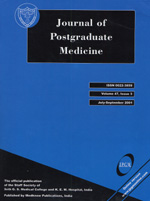
|
Journal of Postgraduate Medicine
Medknow Publications and Staff Society of Seth GS Medical College and KEM Hospital, Mumbai, India
ISSN: 0022-3859
EISSN: 0022-3859
Vol. 50, No. 3, 2004, pp. 189-194
|
 Bioline Code: jp04062
Bioline Code: jp04062
Full paper language: English
Document type: Research Article
Document available free of charge
|
|
|
Journal of Postgraduate Medicine, Vol. 50, No. 3, 2004, pp. 189-194
| en |
Association between glycaemic control and quality of life in diabetes mellitus
Lau Chuen-Yen, Qureshi AK, Scott SG
Abstract
Background:
Relationship between quality of life (QOL) and haemoglobin A1c (HbA1c) amongst diabetics in the community setting is unclear.
Aims:
Assess the association between QOL and change in HbA1c in diabetic patients over one year.
Settings and Design:
Cohort study of patients from four community clinics in California, USA.
Methods:
Diabetic patients identified from databases using International Classification of Disease (ICD-9) codes were asked to complete Short Form 36 (SF-36), which measures health-related QOL, and invited to attend monthly diabetes workshops. From December 2000 to December 2001, data were collected on multiple parameters, including HbA1c. SF-36 surveys were re-collected at project termination.
Statistical Analysis:
Regression analysis was used to correlate change in HbA1c with change in QOL physical component summary (PCS) and mental component summary (MCS) scores, while considering potential confounders.
Results:
Of 1679 eligible patients, 380 completed SF-36 at project initiation. 243 of those completed SF-36 at project termination. Pre and post HbA1c data were available for 170 of the 243 who completed SF-36 at both times. Average MCS increased by 8.46% and PCS decreased by 2.24%. After adjustment, a 5% decrease in HbA1c values was associated with a 1% increase in MCS. No association between changes in HbA1c and PCS was observed.
Conclusions:
Association between better HbA1c and improved mental, but not physical, QOL may reflect physical inconvenience of increased regimen complexity and mental empowerment from proactive disease management. Larger cohort studies with longer follow-up are needed to further elucidate the relationship between glycemic control and QOL.
Keywords
Glycemic control, Quality of life, SF-36, Diabetes
|
| |
© Copyright 2004 Journal of Postgraduate Medicine.
Alternative site location: http://www.jpgmonline.com
|
|
